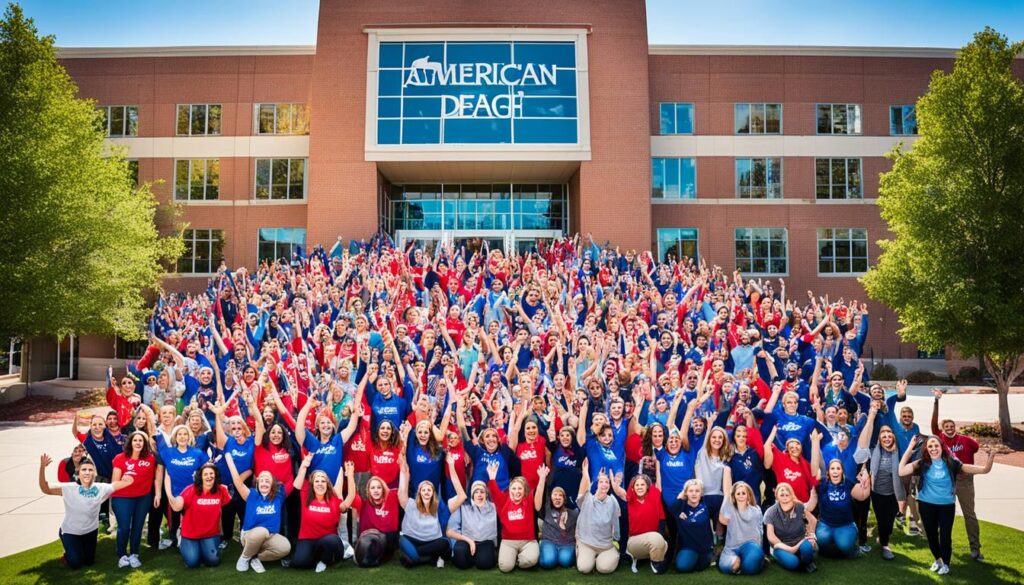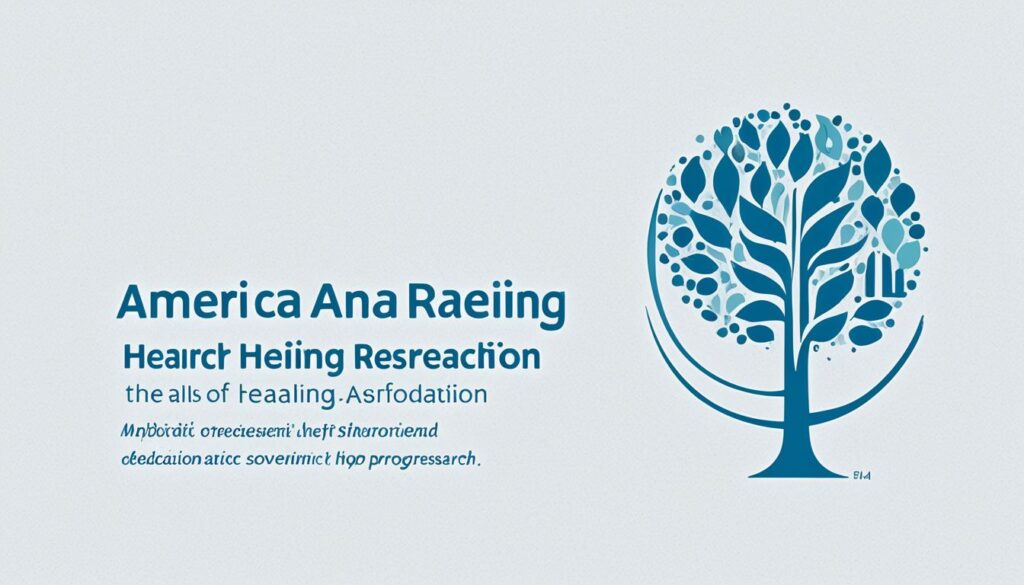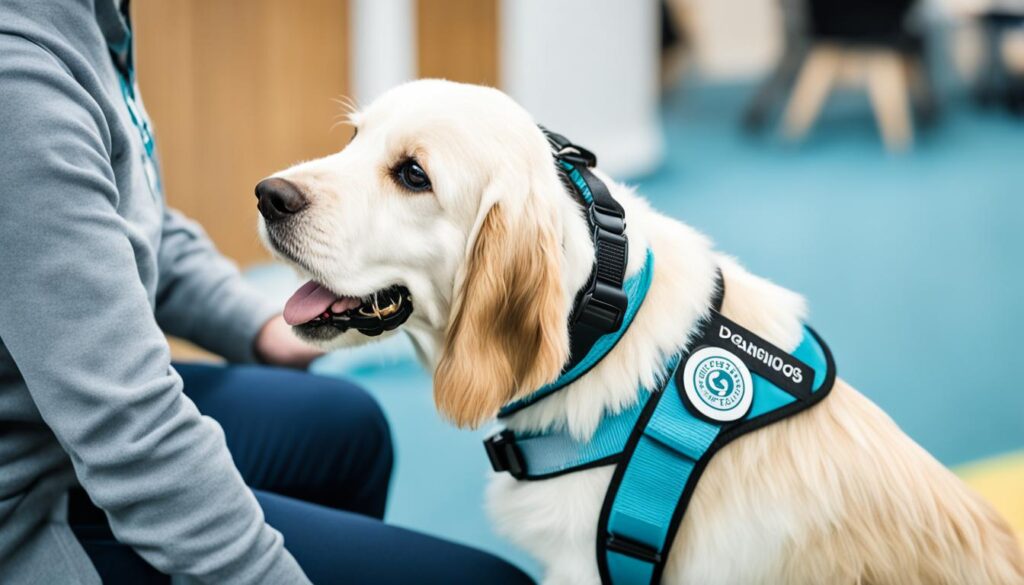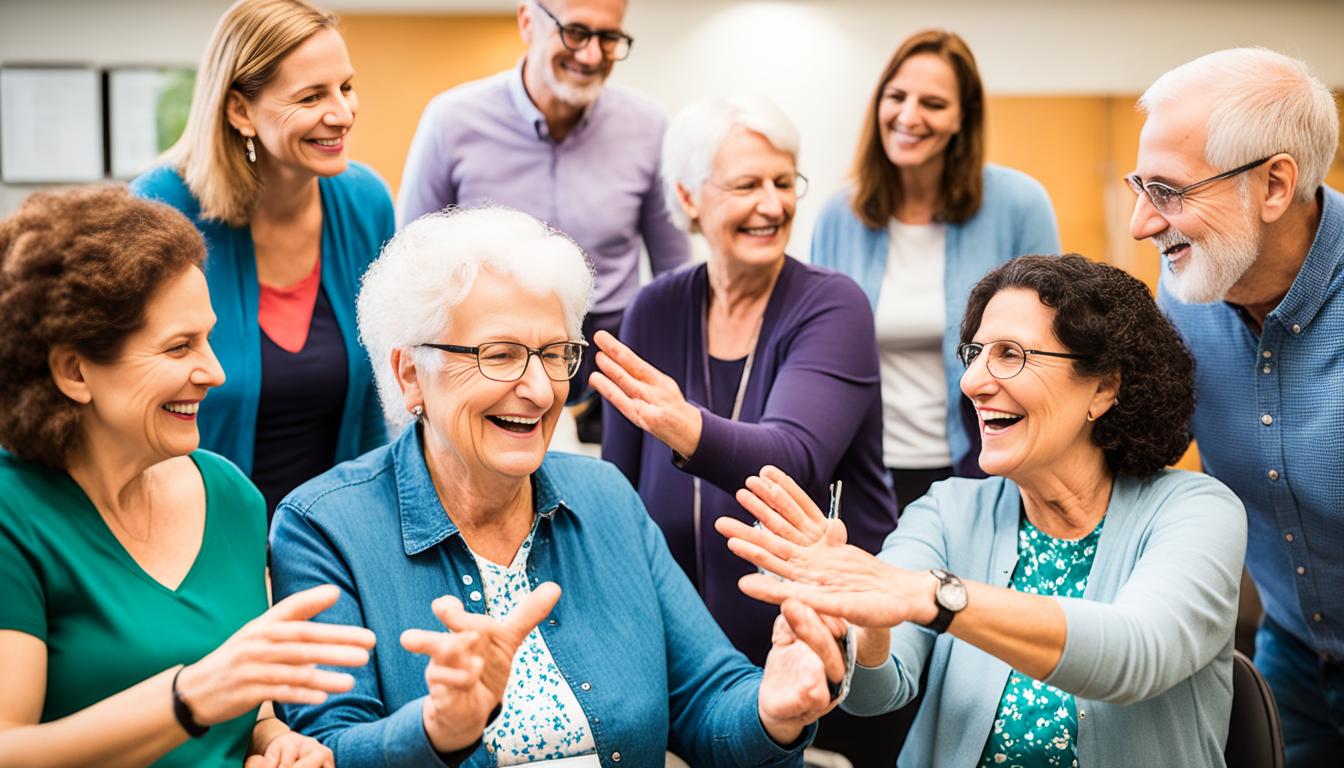Were you aware that globally, there are approximately 430 million individuals experiencing hearing loss to a degree that it hampers their daily activities? Furthermore, projections indicate this figure is expected to surge to an astonishing 700 million by the year 2050. Such data underscores the profound effects of hearing impairment on people and underscores the critical demand for assistance and resources for the deaf community.
Many deaf and hard-of-hearing individuals face discrimination and limited opportunities in employment, education, and social settings. However, there are numerous organizations working tirelessly to improve the lives of the deaf community by providing inclusive support, resources, and advocacy.
Key Takeaways:
- There are currently around 430 million people worldwide with disabling hearing loss.
- This number is expected to rise to 700 million by 2050.
- Deaf individuals face discrimination and limited opportunities.
- Top organizations for the deaf provide support, resources, and advocacy.
- These organizations are crucial in enhancing accessibility and improving the lives of deaf individuals.
American School for the Deaf
The American School for the Deaf, founded in 1817, is the first permanent school for the deaf in the US. It has been providing quality education and resources for the deaf community for over two centuries. The school is committed to a barrier-free, inclusive environment that fosters deaf education and empowers deaf and hard-of-hearing students.
At the American School for the Deaf, deaf students receive comprehensive and inclusive education that meets their unique needs. The school implements a Bilingual Approach to communication, offering instruction in both English and American Sign Language (ASL). This approach ensures that students develop fluency in both languages, facilitating their academic success and social integration.
The school caters to students of all ages, from infancy to high school. They have competent teachers and staff who are experienced in deaf education and create an environment conducive to learning and growth. In addition to academic programs, they offer transition services to help students prepare for post-secondary education or employment. The school also provides residential treatment services for students with significant challenges.
The American School for the Deaf has been a trailblazer in deaf education, continually evolving its programs and services to meet the changing needs of the deaf community. With a rich history of excellence, the school has played a crucial role in advancing inclusive deaf education and providing resources for the deaf.

Notable Programs and Resources
The American School for the Deaf offers a range of programs and resources to support the academic and personal development of deaf students. Some of their notable programs include:
- Early Childhood Program: This program focuses on the early development of deaf and hard-of-hearing children, providing a strong foundation for future learning.
- Elementary and Secondary Education: The school offers a comprehensive curriculum that aligns with national standards, ensuring that students receive a well-rounded education.
- Transition Services: The transition services help students transition from high school to post-secondary education, vocational training, or employment.
- Residential Treatment Center: For students with complex needs, the school provides residential treatment services, offering specialized care and support.
The American School for the Deaf also collaborates with other institutions and organizations to promote deaf education and advocate for the rights of deaf individuals. Their commitment to inclusive education and empowerment has had a significant impact on the deaf community, fostering a sense of belonging and creating opportunities for deaf individuals to thrive.
| Benefits of the American School for the Deaf | Challenges Addressed |
|---|---|
| Quality education in a barrier-free, language-accessible environment | Discrimination and limited opportunities in education |
| Instruction in English and American Sign Language | Communication barriers and language deprivation |
| Programs for transition services and residential treatment | Ensuring successful transitions and addressing complex needs |
| Rich history and expertise in deaf education | Advocacy for inclusive education and empowerment of deaf individuals |
The American School for the Deaf continues to be a leading institution in deaf education, empowering generations of deaf individuals and fostering a sense of pride and identity within the deaf community. Through their commitment to inclusivity and excellence, they serve as a beacon of hope and opportunity for deaf students across the country.
American Society for Deaf Children
The American Society for Deaf Children, established in 1967, is a vital resource for families raising deaf children. The organization was founded by parents who understand the unique challenges faced by deaf individuals and their families.
With a mission to support and empower these families, the American Society for Deaf Children offers a range of valuable resources and programs. One such resource is their American Sign Language (ASL) classes, which help parents effectively communicate with their deaf child. By learning ASL, parents can foster a deeper understanding and connection with their child, while also promoting the use of sign language as a valuable communication tool.
The organization also offers the ASL Ambassadors program, which provides deaf role models who share their experiences and insights with families and communities. Through these ambassadors, families can gain a better understanding of deaf culture, the deaf community, and the resources available to them.
“The American Society for Deaf Children has been a lifeline for our family. Their ASL classes allowed us to communicate more effectively with our deaf child, and their ASL Ambassadors program has provided us with invaluable guidance and support.”
In addition to supporting families, the American Society for Deaf Children also focuses on educating educators and providers. By offering resources and training, they strive to foster an understanding of deaf culture and the unique needs of deaf children. This ensures that educators and providers are equipped to provide inclusive and effective support for deaf students, further enhancing the accessibility and quality of deaf education.
The American Society for Deaf Children has positively impacted numerous families and communities through their programs and initiatives. By providing reliable information, valuable resources, and a supportive community, they are helping deaf children and their families navigate the challenges of raising a deaf child and thrive in a society that embraces inclusivity and diversity.

In the next section, we will explore another organization dedicated to improving the lives of individuals with hearing loss through groundbreaking research and advocacy.
Hearing Health Foundation
The Hearing Health Foundation is a pioneering organization that has been at the forefront of hearing research and support for hearing-impaired individuals since its establishment in 1958. With a primary focus on funding innovative research, the foundation aims to enhance our understanding of hearing, prevent hearing loss, and ultimately find a cure for hearing-related conditions. The Hearing Health Foundation has made significant contributions to the field of hearing research, driving advancements in hearing health and balance.
Through their research initiatives, the Hearing Health Foundation strives to improve the lives of those affected by hearing loss. By supporting groundbreaking studies, they pave the way for new treatments, interventions, and preventive measures to enhance hearing health. Additionally, the foundation plays a crucial role in raising awareness about the importance of hearing health and promoting safe listening practices to prevent hearing loss.
With their unwavering commitment to hearing research, the Hearing Health Foundation continues to make a lasting impact on the lives of individuals with hearing loss. Through their efforts, they provide hope, support, and a better understanding of hearing-related conditions.

Key Contributions of the Hearing Health Foundation:
| Research Funding | Advancements in Hearing Health | Advocacy for Safe Listening |
|---|---|---|
| Funds innovative research on hearing | Drives advancements in hearing health and balance | Raises awareness about the importance of safe listening practices |
| Supports groundbreaking studies | Enhances understanding of hearing-related conditions | Promotes preventive measures to prevent hearing loss |
| Contributes to the development of new treatments | Provides hope and support for individuals with hearing loss | Ensures a better quality of life for those affected by hearing loss |
Through their tireless efforts, the Hearing Health Foundation serves as a beacon of hope for the hearing-impaired community. Their dedication to hearing research and support plays a crucial role in preventing hearing loss, improving treatment options, and ultimately empowering individuals with hearing loss to lead fulfilling and connected lives.
American Hearing Research Foundation
The American Hearing Research Foundation is committed to advancing hearing research and promoting the prevention and treatment of hearing disorders. Through funding and support, they drive scientific investigations to deepen our understanding of the mechanisms of hearing and develop innovative therapies for individuals with hearing loss. With a focus on improving the quality of life for hearing-impaired individuals, the foundation plays a vital role in promoting awareness, prevention, and treatment of hearing disorders.
Research and Advancements
The American Hearing Research Foundation supports groundbreaking research initiatives that aim to uncover the intricacies of hearing and balance. By investing in scientific investigations, they contribute to the development of new treatments and interventions for individuals with hearing loss, fostering a greater understanding of the complexities of hearing mechanisms.
The foundation’s dedication to research has paved the way for significant advancements in the field of hearing, enabling the development of cutting-edge therapies and interventions.
Prevention and Treatment
Recognizing the importance of hearing loss prevention, the American Hearing Research Foundation actively promotes awareness and education to prevent hearing disorders. By offering resources and support, they empower individuals to make informed decisions and take proactive steps to protect their hearing health.
Support for Hearing-Impaired Individuals
Central to their mission, the American Hearing Research Foundation aims to improve the lives of those with hearing loss by providing support and guidance. They collaborate with healthcare professionals and organizations to ensure individuals have access to comprehensive care and tailored treatment options.
Hearing Research and Beyond
Through their dedication to hearing research, the American Hearing Research Foundation not only contributes to advancements in the field but also facilitates a greater understanding of the challenges faced by hearing-impaired individuals. Their collective efforts contribute to a more inclusive society that values and supports the diverse needs of the hearing-impaired community.

Central Institute for the Deaf
The Central Institute for the Deaf is a renowned organization that focuses on research, education, and outreach programs for individuals with hearing loss. They have been instrumental in advancing the understanding of hearing impairment and developing effective educational strategies for deaf individuals. The institute offers a wide range of programs and services to support the needs of the deaf community.
At the Central Institute for the Deaf, they provide comprehensive audiology services to diagnose and manage hearing loss. Their team of experts utilizes the latest technology and research to ensure accurate assessments and personalized treatment plans. They also offer speech and language therapy to help individuals improve their communication skills and enhance their overall quality of life.
In addition to their clinical services, the Central Institute for the Deaf is actively involved in research initiatives focused on the development of innovative solutions for hearing impairment. Through their research efforts, they strive to improve the understanding of hearing loss and contribute to the advancement of hearing-related technologies.
The institute is committed to promoting deaf education programs and ensuring that deaf individuals have access to quality education. They offer educational resources and support for parents, educators, and professionals working with deaf students. By providing guidance and training, the Central Institute for the Deaf plays a crucial role in empowering deaf individuals to reach their full potential in academics and beyond.
Through their dedication to research, education, and advocacy, the Central Institute for the Deaf continues to make significant contributions to the field of hearing impairment and deaf education. Their commitment to enhancing the lives of individuals with hearing loss is truly commendable.

Education Programs Offered by the Central Institute for the Deaf
| Program | Description |
|---|---|
| Audiology Services | Comprehensive audiology services to diagnose and manage hearing loss. |
| Speech and Language Therapy | Therapy programs to improve communication skills for individuals with hearing impairments. |
| Educational Resources | Access to educational materials and resources for parents, educators, and professionals working with deaf students. |
| Research Initiatives | Active involvement in research projects to advance the understanding of hearing impairment and develop innovative solutions. |
National Association of the Deaf
The National Association of the Deaf (NAD) is a prominent organization dedicated to safeguarding the civil rights of deaf and hard-of-hearing individuals. As one of the leading deaf rights organizations, the NAD focuses on advocating for equal access to essential services such as healthcare, education, and employment. Through their proactive efforts, the NAD strives to eliminate discrimination and promote inclusivity in all aspects of life.
The NAD plays a vital role in empowering the deaf community by providing valuable resources and information on deaf rights. Their comprehensive website offers a wealth of resources, ranging from legal information to education initiatives. Additionally, the NAD organizes conferences and events to bring together individuals invested in the betterment of the deaf community, creating a platform for networking and knowledge exchange.
The NAD’s commitment to deaf advocacy is further exemplified through their publication of news updates and blogs. By disseminating relevant and timely information, the association keeps the community informed about important developments, challenges, and success stories.
Empowering the Deaf Community
The National Association of the Deaf believes that every individual deserves equal opportunities and accessibility. By championing the rights of the deaf and hard-of-hearing, the NAD strives to eliminate barriers and create an inclusive society. Through their advocacy efforts, the association ensures that policies and laws are in place to protect the rights of the deaf community.
- Advocating for equal access to healthcare services, including the provision of sign language interpreters in medical settings.
- Promoting inclusive education policies that prioritize the needs of deaf students and facilitate their academic success.
- Fighting for equal employment opportunities and advocating against workplace discrimination based on deafness or hearing loss.
- Collaborating with government entities and other deaf advocacy groups to influence legislative changes that support and protect the rights of the deaf community.
Through their extensive services and initiatives, the National Association of the Deaf is a pivotal force in improving the lives of deaf individuals and fostering a sense of community. Their dedication to amplifying the voices and perspectives of the deaf community has led to significant strides in deaf rights and increased awareness of the unique issues faced by this population.
Joining Forces for Change
As a collective force, deaf advocacy groups and organizations like the National Association of the Deaf work together to effect change in society. By joining forces, these organizations amplify their voices and increase their influence in promoting deaf rights and improving accessibility. Collaboration with other organizations allows for a broader reach and a more comprehensive approach to addressing the challenges faced by the deaf community.
| Deaf Advocacy Groups | Mission and Activities |
|---|---|
| American Society for Deaf Children | Promotes the education, well-being, and support of deaf children and their families through resources and advocacy initiatives. |
| Hearing Loss Association of America | Provides support, resources, and advocacy for individuals with hearing loss, fostering awareness and inclusion within society. |
| Alexander Graham Bell Association for the Deaf and Hard of Hearing | Offers educational programs and resources for individuals with hearing loss and their families, promoting listening and spoken language approaches. |
| Deaf Dogs Rock | Supports and advocates for the rights and welfare of deaf dogs, promoting awareness and adoption of these special animals. |
These organizations, along with many others, collaborate with the National Association of the Deaf to create a strong network of support for the deaf community. Together, they strive to break down barriers, promote inclusion, and empower individuals to live their lives to the fullest.

Hearing Loss Association of America
The Hearing Loss Association of America (HLAA) is a leading organization dedicated to providing support, resources, and advocacy for individuals with hearing loss. Whether you have recently been diagnosed with hearing loss or have been living with it for years, the HLAA offers a wide range of programs and services to help you navigate the challenges and improve your quality of life.
One of the valuable resources provided by the HLAA is their support groups for the deaf. These support groups serve as a safe and welcoming space where individuals with hearing loss can connect with others facing similar challenges. Through sharing experiences, strategies, and emotional support, these groups offer a sense of community and empowerment.
The HLAA is also known for its comprehensive collection of educational materials. They provide resources such as brochures, fact sheets, and online articles that cover a variety of topics related to hearing loss. These materials offer guidance on communication strategies, assistive technology options, and tips for navigating social and workplace environments.
Additionally, the HLAA offers access to assistive technology resources. They provide information on the latest hearing aids, cochlear implants, and other assistive devices that can enhance communication and improve hearing abilities. By staying up-to-date with advancements in technology, the HLAA ensures that individuals with hearing loss have access to the best tools available.
One of the core missions of the HLAA is to raise awareness about hearing loss and advocate for better accessibility and inclusion. They work towards creating a more inclusive society by promoting the rights and needs of individuals with hearing loss. Through their efforts, they have influenced policy changes, increased public understanding, and improved the overall treatment of individuals with hearing impairment.
Overall, the Hearing Loss Association of America plays a vital role in providing support, resources, and advocacy for individuals with hearing loss. Whether it’s through support groups, educational materials, or assistive technology resources, the HLAA is committed to empowering and improving the lives of those with hearing impairment.
Dogs for Better Lives
Assistance animals play a crucial role in improving the lives of individuals with disabilities, including those who are deaf. Dogs for Better Lives is an organization that specializes in training and providing hearing dogs to assist deaf individuals in various aspects of their daily lives.
These specially trained hearing dogs are highly skilled at alerting their deaf owners to important sounds, such as alarms, doorbells, or someone calling their name. By acting as a bridge between the deaf individual and their auditory environment, these dogs enhance independence, safety, and overall quality of life.
The Dogs for Better Lives team works closely with individuals to match them with the most suitable hearing dog based on their lifestyle, needs, and preferences. Once a match is made, the organization provides comprehensive training to both the dog and their new owner. This training ensures that the dog can effectively communicate important sounds while also forming a strong bond with their owner.
In addition to training and placement, Dogs for Better Lives offers ongoing support and resources to deaf individuals and their hearing dogs. They understand the importance of continued training, socialization, and veterinary care to maintain the partnership between the deaf individual and their assistance animal.
Through their dedication and expertise, Dogs for Better Lives has significantly improved the lives of many deaf individuals by providing them with loyal and reliable assistance animals. These hearing dogs not only offer practical support but also provide companionship, emotional support, and a sense of security for their deaf owners.
If you or someone you know is deaf and would benefit from the companionship and assistance provided by a hearing dog, Dogs for Better Lives is there to help. Reach out to them to learn more about their programs and the process of acquiring a hearing dog that can truly make a difference in your life.

| Benefits of Hearing Dogs from Dogs for Better Lives |
|---|
| Enhanced independence and safety |
| Improved communication with the auditory environment |
| Companionship and emotional support |
| Sense of security |
Alexander Graham Bell Association for the Deaf and Hard of Hearing
The Alexander Graham Bell Association for the Deaf and Hard of Hearing is a leading organization dedicated to supporting individuals with hearing loss and their families. With a focus on deaf education programs and resources, this association plays a crucial role in empowering and enhancing the lives of those in the deaf community.
The association offers comprehensive programs catering to children, parents, and professionals involved in deaf education. These programs aim to provide valuable guidance and support while promoting listening and spoken language approaches. By equipping families with the necessary tools and knowledge, they assist in navigating the journey of raising a child with hearing loss.
Through their initiatives, the Alexander Graham Bell Association has made significant contributions to the field of deaf education. They strive to empower individuals with hearing loss by providing them with the resources and support they need to thrive in various aspects of life.

With their commitment to deaf education programs, the Alexander Graham Bell Association remains at the forefront of advancing accessibility and support for the deaf community. Their efforts have positively impacted numerous individuals with hearing loss, enabling them to reach their full potential and lead fulfilling lives.
| Key Features of the Alexander Graham Bell Association for the Deaf and Hard of Hearing |
|---|
| Comprehensive programs for children, parents, and professionals involved in deaf education. |
| Emphasis on listening and spoken language approaches to communication. |
| Guidance and support for families raising children with hearing loss. |
| Empowering individuals with hearing loss through resources and advocacy. |
Conclusion
In conclusion, the deaf community is fortunate to have a wide array of organizations dedicated to providing support, resources, and advocacy. These organizations, such as the American School for the Deaf, National Association of the Deaf, and others, play a vital role in enhancing accessibility, promoting awareness, and improving the lives of deaf individuals. They provide crucial services like inclusive education, sign language advocacy, deaf rights initiatives, and support groups for both individuals and families.
By supporting these organizations and raising awareness about the challenges faced by the deaf community, we can foster a more inclusive and equitable society for all. These organizations not only empower deaf individuals but also educate the public on the rich deaf culture and the importance of deaf accessibility. With their dedication and tireless efforts, they continue to make a significant impact in improving the lives of deaf individuals and advocating for their rights.
It is essential to recognize and appreciate the invaluable work done by organizations for the deaf in creating an inclusive and supportive environment. We can contribute to their efforts by volunteering, donating, or simply spreading awareness about the services they provide. Together, we can ensure that deaf individuals have the support, resources, and opportunities they need to thrive and be fully included in society.
FAQ
What are some organizations for the deaf that offer support and resources?
There are numerous organizations dedicated to supporting the deaf community, including the American School for the Deaf, American Society for Deaf Children, Hearing Health Foundation, American Hearing Research Foundation, Central Institute for the Deaf, National Association of the Deaf, Hearing Loss Association of America, Dogs for Better Lives, and Alexander Graham Bell Association for the Deaf and Hard of Hearing.
What services does the American School for the Deaf provide?
The American School for the Deaf offers quality education in a barrier-free, language-accessible environment for deaf and hard-of-hearing students. They utilize a Bilingual Approach to communication, offering instruction in both English and American Sign Language. The school serves children of all ages, from infancy to high school, and also provides programs for transition services and residential treatment for students with significant challenges.
What does the American Society for Deaf Children offer?
The American Society for Deaf Children was established to support and empower families raising deaf children. They provide valuable information to help parents effectively communicate with their deaf child, including American Sign Language classes and ASL Ambassadors programs. The organization also offers resources for educators and providers to foster an understanding of deaf culture and the unique needs of deaf children.
How does Hearing Health Foundation contribute to the field of hearing research?
The Hearing Health Foundation funds innovative and promising research on hearing to better understand, prevent, and cure hearing loss. They support groundbreaking studies and advancements in hearing health and balance. By investing in research and promoting safe listening practices, the foundation aims to improve the lives of those affected by hearing loss and raise awareness about the importance of hearing health.
What is the focus of the American Hearing Research Foundation?
The American Hearing Research Foundation is dedicated to funding research on hearing and balance. They support scientific investigations to advance the understanding of hearing mechanisms and develop new treatments for hearing loss. The foundation aims to improve the quality of life for hearing-impaired individuals by promoting awareness, prevention, and treatment of hearing disorders.
What programs does the Central Institute for the Deaf offer?
The Central Institute for the Deaf focuses on research, education, and outreach programs for individuals with hearing loss. They offer audiology services, speech and language therapy, and educational resources. Through their research and advocacy efforts, the institute has made significant contributions to the field of hearing impairment and deaf education.
What is the mission of the National Association of the Deaf?
The National Association of the Deaf (NAD) works to safeguard the civil rights of deaf and hard-of-hearing individuals. They advocate for equal access to healthcare, education, employment, and other essential services. The NAD provides resources and information on deaf rights, organizes conferences and events, and publishes news updates and blogs to keep the community informed.
What does the Hearing Loss Association of America offer?
The Hearing Loss Association of America (HLAA) provides support, resources, and advocacy for individuals with hearing loss. They offer support groups, educational materials, and assistive technology resources to help individuals navigate the challenges of hearing loss. The HLAA also works to raise awareness about hearing loss and advocates for better accessibility and inclusion.
How does Dogs for Better Lives assist individuals with deafness?
Dogs for Better Lives is an organization that trains and provides assistance dogs to individuals with various disabilities, including deafness. They train hearing dogs to alert deaf individuals to important sounds and enhance their independence and safety. By matching individuals with the most suitable hearing dog and providing ongoing support and training, Dogs for Better Lives significantly improves the lives of many deaf individuals.
What services does the Alexander Graham Bell Association for the Deaf and Hard of Hearing offer?
The Alexander Graham Bell Association for the Deaf and Hard of Hearing offers comprehensive programs and resources for children, parents, and professionals involved in deaf education. The association promotes listening and spoken language approaches, providing guidance and support for families raising children with hearing loss. They are actively involved in deaf education and empower individuals with hearing loss.
Why are organizations for the deaf important?
Organizations for the deaf play a vital role in enhancing accessibility, promoting awareness, and improving the lives of deaf individuals. They provide support, resources, and advocacy to address the unique challenges faced by the deaf community. By supporting these organizations and raising awareness about the challenges faced by the deaf community, we can create a more inclusive and equitable society for all.











